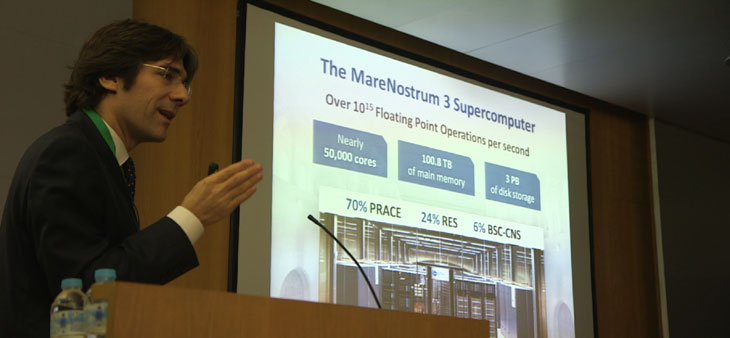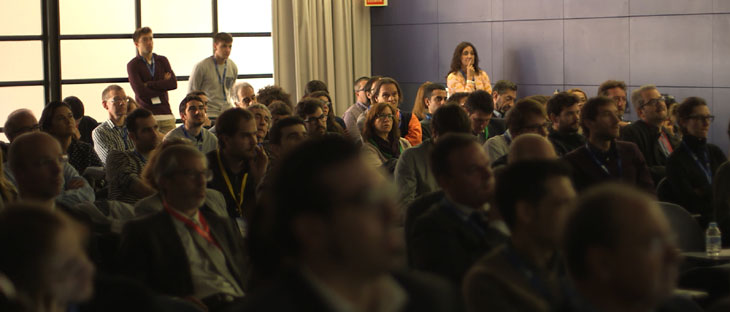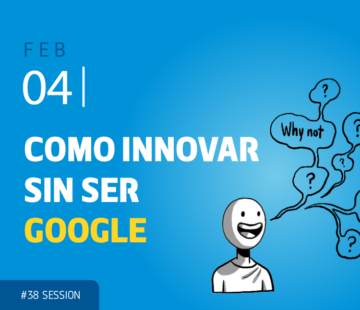Co-Session #27 (I): Artificial Intelligence for Business

AI is now among us and the question is not whether companies will use it in their operations or as the basis for new business models, but when they are going to do it and in what way. Our last Co-Session sought to explore the answer to these questions and show at first hand cases in which Artificial Intelligence is applied to the world of business.
And for this there could have been no better host than the Barcelona Supercomputing Center (BSC). BSC is a research center that is home to the MareNostrum supercomputer. Josep María Martorell, the center’s Associate Director, and Jordi Torres, one of its researchers, kicked off this Co-Session with an introduction to the current status of the raft of technologies collectively known as Artificial Intelligence. We learnt that its incipient market, in which multimillion dollar investments are already being made in the world’s biggest tech companies, is set to change everything, from the food we eat to our healthcare systems, as well as the current concept of work.
IBM’S Watson
This introduction also helped us understand that we are entering a new era of the democratization of computing power, and that companies that delay in incorporating AI into their strategies can suffer the same consequences as those who took their time getting onto the Internet. One of the most advanced and paradigmatic examples of Artificial Intelligence and computing superpower available for companies is undoubtedly the services linked to IBM’s Watson system. Alfred Escala, Vice President of IBM’s SPGI Financial Services, was on hand at this Co-Session to explain how Watson is already being used by companies from different sectors.
Certainly the best-known Artificial Intelligence system after beating the top contestants on the TV game show Jeopardy!, Watson is opening up a new era for computing by including elements of human perception and reasoning. Its natural language interaction capabilities make it especially in demand for the automation of Call Center systems or to operate robots that can analyze the context of each interaction with humans and learn from them. Watson’s first banking project in Europe has been an advisory system for Caixabank’s Foreign Trade consultants.

AI Business Cases
The increased democratization of computing power and Artificial Intelligence is perhaps best reflected in the appearance of a growing number of startups offering new products and services associated with these new technologies. Some of these new companies were invited to this Co-Session to share their experience.
TheThings.IO was one of them. For its founder, Marc Pous, the Internet of Things will not make sense without Artificial Intelligence. TheThings is already being used in a wide range of sectors, for instance logistics to manage fleets of trucks more efficiently and maintain the cold chain needed to transport certain types of goods. AI linked to the Internet of Things has also found its first industrial applications in fields like asset management and predictive maintenance. For its part, iMath Services has specialized in Big Data services that use AI technologies to better understand customer needs and behavior. Iñigo Zubizarreta, co-founder and CEO of this startup, explained how the company applies predictive models for one of its customers, a telecommunications company, which help predict customer attrition and offer the products and services that are most likely to be contracted by each of its more than one million users.
“Large companies should feel more threatened than ever by small startups, as with access to AI technologies they are going to be able to do great things with much less.” These were the words of Javier de la Rosa, co-founder of Sadako Technologies, for whom Artificial Intelligence is a truly disruptive innovation in the robotics field. Sadako Technologies uses this combination of robotics and Artificial Intelligence to provide a low-cost solid waste separation system using multilayer neural network algorithms (Deep Learning) that allow waste materials to be recognized from images taken by a simple camera. Instead of programming detection rules, this system uses Machine Learning techniques that allow it to learn from its experience separating waste.
If up to now humans have had to understand machines in order to use them, now it is the machines that are going to start to be able to understand humans. AI is also responsible for this paradigm shift. The Swedish company Artificial Solutions has spent 15 years teaching machines to understand natural language. Joaquim Bargalló, Professional Services Director Europe, described several practical applications for these technologies. Meanwhile, Caterina Font, co-founder of Counterest, a startup dedicated to analyzing customer behavior in physical spaces, stressed the important point that to make efficient use of AI technologies, we first and foremost need to know how to ask the right questions that are to be answered by these new systems.

